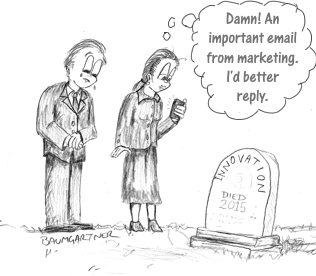
Innovation is Dead. Long Live Innovation.
By Jeffrey Baumgartner
Innovation is dead. I am sorry to be the one to tell you this, but I thought you should know.
Of course, I mean business innovation is dead, at least as a fad. We should not complain. As business fads go, innovation has had a run of a decade. That's rather good as these things go.
Businesses Will Still Innovate, But...
Of course, a small handful of businesses will still innovate. Some will continually pump stunning new products and services. Others will develop great new business processes and business models that other companies will emulate and which will eventually become business school case study material. Less bold companies will continually copy the innovators as well as incrementally improve their products, services and processes. All of this is essential in our technology driven capitalist system that strives to make products people buy while squeezing every gram of productivity they possibly can from employees.
In short, businesses will still innovate. However, you will be seeing the word "innovation" less frequently in company slogans, on their web sites and in their printed literature. Innovation managers will be given new titles that do not include the i-word. Investment in idea management software and brainstorming facilitators will largely dry up and business will continue on its merry way, chasing the next big thing.
Why Innovation Is Dying
Why is innovation dead -- or at least dying? There are a couple of reasons. First off, it has always been a business trend. You knew that. I knew that. But in our enthusiasm for innovation, we pushed that awareness aside and enjoyed one of the business world's most fun ever trends.
Secondly, the fad for innovation has never really affected how businesses actually innovate. Some companies have been innovative leaders and, as I have written in the past, they do not really worry about innovation. Rather, they worry about relentlessly striving to achieve strategic goals. Innovation as just been a tool to help them get there.
Less innovative companies have jumped at the innovation fad, but rather than focus on innovation as a tool, they tend to see innovation as an end result. Such companies collect ideas in suggestion schemes, idea management software, ideas campaigns and brainstorms. Ideas are, by and large, unfocused and mediocre. A tiny percentage are implemented and they typically amount to incremental product and process improvements. The result has been a minor improvement in the bottom line and a sense of legitimacy regarding the business's excessive use of the word "innovate" and its variants in corporate communications.
Dismantling Initiatives
Now that innovation as a fad is slowly dying, these companies will begin to dismantle such directionless innovation tools and invest in the next fad. And maybe that's a good thing. Too many extremely competent innovation managers are frustrated by their inability to make a real difference in their employers' innovation results. Too many talented consultants have dived into companies with worthwhile advice that is largely ignored. And too many barely competent innovation consultants have been spoiling the reputations of the more competent.
But, as I wrote earlier, innovation is only dead as a trend. Companies that understand that innovation is a tool, not an end result will continue to innovate. Leaders, of less innovative businesses, who get that they will need to make big changes in how they work if they want to be leaders in their markets will adopt innovation even if they won't bandy the word about so much any more.
So, dear reader, worry not. Innovation may be dead -- as a trend -- but it will thrive as a more robust and effective tool that business leaders will continue to exploit as long as capitalism and technology exist. To paraphrase the British on the death of a monarch: "innovation is dead. Long live innovation!"
The Next Fad: Wellness
As for the next big business trend, I believe it is Wellness. In their craze to squeeze every gram of productivity out of employees through long working hours, maintaining 24 hour contact through mobile devices and using productivity tools that prevent employees from relaxing, companies are working their people to ill health and early death. More and more people are stressed out, have no time to relax and adopt unhealthy habits such as eating processed food, not sleeping enough and failing to exercise.
Of course, companies could respond to this by reducing working hours, reducing productivity demands and not exploiting communications technology to make demands on employees at night, on the weekends and during holidays. But that would cost millions. Hiring mindfulness gurus to lead workshops and give talks costs mere thousands.




